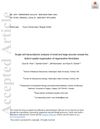TLDR Fibroblasts are important in healing diabetic wounds, but high sugar levels can harm their function and slow down the healing process.
The document "Fibroblasts: Immunomodulatory factors in refractory diabetic wound healing" discusses the role of fibroblasts in the healing of chronic diabetic wounds. Fibroblasts, previously considered "immune neutral" cells, are now recognized as critical in the wound healing process, as they construct and reshape the extracellular matrix and regulate the immune response. The study found that high glucose levels negatively affect the proliferation and migration of hepatocyte growth factors, leading to fibroblast dysfunction and delayed wound healing. Oxidative stress in a high glucose environment is identified as the cause of this dysfunction. The study also found a significant reduction in myofibroblasts in diabetic rats compared to non-diabetic rats, which is associated with decreased tissue remodeling, increased inflammation, and delayed myofibroblast differentiation. The document suggests that further research on fibroblasts could help restore homeostasis in diabetic wound healing.
 35 citations
,
November 2020 in “Experimental Dermatology”
35 citations
,
November 2020 in “Experimental Dermatology” Different types of skin cells are organized in a special way in large wounds to help with healing and hair growth.
 299 citations
,
January 2018 in “Journal of Clinical Investigation”
299 citations
,
January 2018 in “Journal of Clinical Investigation” Different types of fibroblasts play various roles in diseases and healing, and more research on them could improve treatments.
908 citations
,
July 2015 in “British Journal of Dermatology” Acute wounds heal well, but chronic wounds struggle due to ongoing inflammation and poor tissue repair.
1235 citations
,
December 2013 in “Nature” Two fibroblast types shape skin structure and repair differently.
 238 citations
,
March 2013 in “Development”
238 citations
,
March 2013 in “Development” Fat cells help recruit healing cells and build skin structure during wound healing.
36 citations
,
August 2022 in “Molecular Therapy — Nucleic Acids” Gene therapy shows promise for healing chronic wounds but needs more research to overcome challenges.
 33 citations
,
September 2012 in “Wound Repair and Regeneration”
33 citations
,
September 2012 in “Wound Repair and Regeneration” Applying calreticulin can speed up wound healing in diabetics.
19 citations
,
January 2023 in “Frontiers in Bioengineering and Biotechnology” MSC-sEVs may effectively treat chronic non-healing wounds.
33 citations
,
February 2024 in “International Journal of Molecular Sciences” Understanding fibroblast issues in diabetic foot ulcers is key to creating better treatments.
24 citations
,
January 2023 in “International Journal of Nanomedicine” Biomembrane-based hydrogels can effectively promote chronic wound healing.





